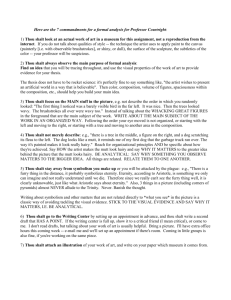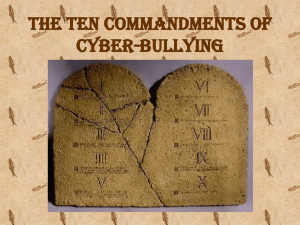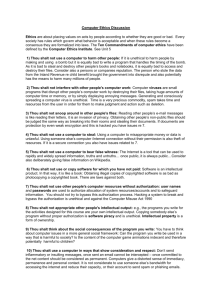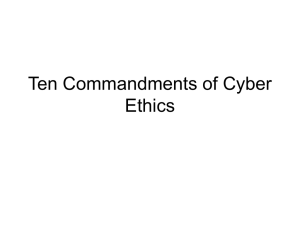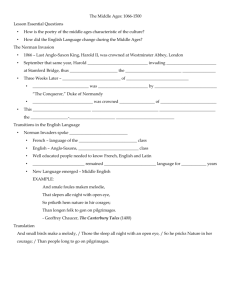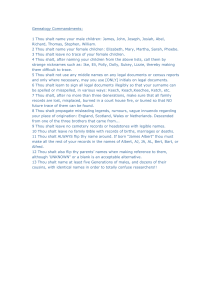Medieval Law and Order - White Plains Public Schools
advertisement
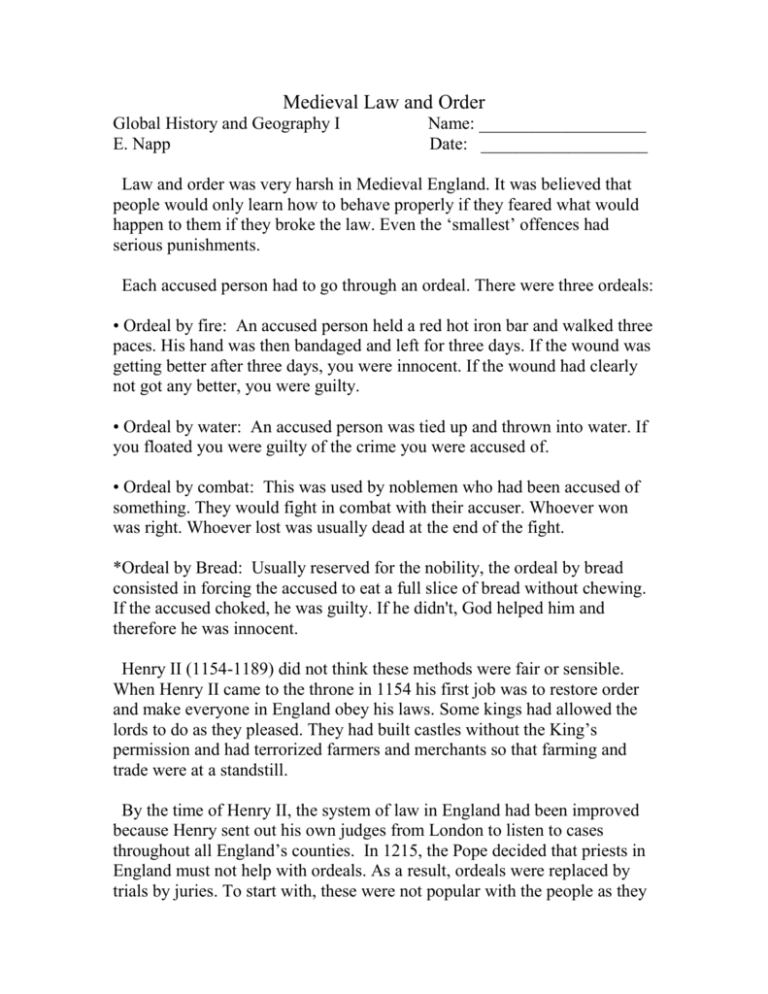
Medieval Law and Order Global History and Geography I E. Napp Name: ___________________ Date: ___________________ Law and order was very harsh in Medieval England. It was believed that people would only learn how to behave properly if they feared what would happen to them if they broke the law. Even the ‘smallest’ offences had serious punishments. Each accused person had to go through an ordeal. There were three ordeals: • Ordeal by fire: An accused person held a red hot iron bar and walked three paces. His hand was then bandaged and left for three days. If the wound was getting better after three days, you were innocent. If the wound had clearly not got any better, you were guilty. • Ordeal by water: An accused person was tied up and thrown into water. If you floated you were guilty of the crime you were accused of. • Ordeal by combat: This was used by noblemen who had been accused of something. They would fight in combat with their accuser. Whoever won was right. Whoever lost was usually dead at the end of the fight. *Ordeal by Bread: Usually reserved for the nobility, the ordeal by bread consisted in forcing the accused to eat a full slice of bread without chewing. If the accused choked, he was guilty. If he didn't, God helped him and therefore he was innocent. Henry II (1154-1189) did not think these methods were fair or sensible. When Henry II came to the throne in 1154 his first job was to restore order and make everyone in England obey his laws. Some kings had allowed the lords to do as they pleased. They had built castles without the King’s permission and had terrorized farmers and merchants so that farming and trade were at a standstill. By the time of Henry II, the system of law in England had been improved because Henry sent out his own judges from London to listen to cases throughout all England’s counties. In 1215, the Pope decided that priests in England must not help with ordeals. As a result, ordeals were replaced by trials by juries. To start with, these were not popular with the people as they felt that their neighbors might have a grudge against them and use the opportunity of a trial to get their revenge. After 1275, a law was introduced which allowed people to be tortured if they refused to go to trial before a jury. What Henry II did to restore order: Henry restored order by pulling down illegal castles and bringing back the laws of Henry I. Henry brought in trial by jury and did away with trial by ordeal and battle. Henry sent his judges to different towns to try cases so everyone saw the law working. If you were found guilty of a crime you would expect to face a severe punishment. Thieves had their hands cut off. Women who committed murder were strangled and then burnt. People who illegally hunted in royal parks had their ears cut off and high treason was punishable by being hung, drawn and quartered. There were very few prisons as they cost money and local communities were not prepared to pay for their upkeep. It was cheaper to execute someone for bad crimes or mutilate them and then let them go. Most towns had a gibbet just outside of it. People were hung on these and their bodies left to rot over the weeks as a warning to others. However, such violent punishments clearly did not put off people. In 1202, the city of Lincoln had 114 murders, 89 violent robberies and 65 people were wounded in fights. Only 2 people were executed for these crimes and it can be concluded that many in Lincoln got away with their crime. Questions: 1. Why were punishments so severe in the Middle Ages? _____________________________________________________________ _____________________________________________________________ _____________________________________________________________ 2. What 3 things did Henry II do to restore order in England? _____________________________________________________________ _____________________________________________________________ _____________________________________________________________ 3. Describe the four types of ordeal. _____________________________________________________________ _____________________________________________________________ _____________________________________________________________ _____________________________________________________________ 4. Do you think the ordeals were fair methods to decide whether someone was guilty of a crime? Explain your answer. _____________________________________________________________ _____________________________________________________________ _____________________________________________________________ 5. In 1215 the Pope did something which helped to replace ordeals, what did he do? _____________________________________________________________ _____________________________________________________________ 6. List 3 different crimes and their punishments in Medieval England: _____________________________________________________________ _____________________________________________________________ _____________________________________________________________ 7. Why were there so few prisons in the Middle Ages? _____________________________________________________________ _____________________________________________________________ _____________________________________________________________ 8. What was a ‘gibbet’ used for? _____________________________________________________________ _____________________________________________________________ _____________________________________________________________ 9. Why were the bodies left to rot? _____________________________________________________________ _____________________________________________________________ _____________________________________________________________ List Specific Differences between Our Modern American Legal System and Medieval Justice: _____________________________________________________________ _____________________________________________________________ _____________________________________________________________ _____________________________________________________________ _____________________________________________________________ _____________________________________________________________ _____________________________________________________________ _____________________________________________________________ _____________________________________________________________ _____________________________________________________________ Medieval Knights Medieval knights were skilled warriors on horseback. They were highly disciplined and expected to follow the Code of Chivalry. Chivalry referred to the rules and customs of medieval knighthood. The following is an excerpt regarding the Code of Chivalry. The Ten Commandments of the Code of Chivalry From Chivalry by Leon Gautier I. Thou shalt believe all that the Church teaches, and shalt observe all its directions. II. Thou shalt defend the Church. III. Thou shalt respect all weaknesses, and shalt constitute thyself the defender of them. IV. Thou shalt love the country in the which thou wast born. V. Thou shalt not recoil before thine enemy. VI. Thou shalt make war against the Infidel without cessation, and without mercy. VII. Thou shalt perform scrupulously thy feudal duties, if they be not contrary to the laws of God. VIII. Thou shalt never lie, and shall remain faithful to thy pledged word. IX. Thou shalt be generous, and give largess to everyone. X. Thou shalt be everywhere and always the champion of the Right and the Good against Injustice and Evil. Let’s Restate these Rules in Contemporary English: I. II. III. IV. V. VI. VII. VIII. IX. X. ______________________________________________________ ______________________________________________________ ______________________________________________________ ______________________________________________________ ______________________________________________________ ______________________________________________________ ______________________________________________________ ______________________________________________________ ______________________________________________________ ______________________________________________________
